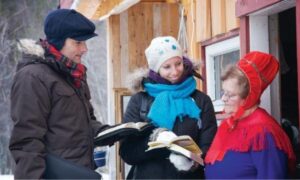A strange decision by an appeal court that ordered a disfellowshipped member of the Jehovah’s Witnesses to be reinstated has been overturned.

Last year, Bitter Winter reported that on July 9, 2021, Norway’s Borgarting Court of Appeal had rendered one of the most bizarre decisions in the recent history of court cases about religion, ordering the Jehovah’s Witnesses to readmit within their fold a woman they had disfellowshipped.
There are dozens of decisions of courts all over the world, including on cases about the Jehovah’s Witnesses, stating that excluding a member from a religious body is a matter that cannot be reviewed by secular courts. An order of readmission of an excluded member was unprecedented. Happily, the Supreme Court of Norway with a unanimous decision (5-0) dated May 3, 2022, has now reversed the strange appeal verdict.
The facts can be shortly summarized as follows. G.N. was a married woman from a provincial Norwegian town, who was a Jehovah’s Witness from 1987 to 2018. In 2018, she accepted to have dinner with a male Jehovah’s Witness, himself divorced, in a restaurant in Oslo, after which they went to the man’s hotel room. They started kissing and fondling. Then, she fell asleep and woke up the next morning, naked and with the man on top of her. Later, the man told her he had started engaging in oral sex with her while she was asleep.
As it is well-known, Jehovah’s Witnesses believe that—according to the Bible—sexual relations should take place only between married people. This teaching is a conditio sine qua non to be part of the religious community. Those who become Jehovah’s Witnesses (including G.N.) are fully aware of it. For this reason, if believers engage in sexual activity with some who are not their spouses, the religious community will consider whether they can continue to be part of the Jehovah’s Witnesses.
When the ecclesiastical judicial committee of Jehovah’s Witnesses examined her case G.N. said that she had drank more alcohol than usual and had willingly lied in the bed with the man, “kissing and fondling.” In the court case, however, she denied these circumstances and said she went to the man’s room just to recover a coat she had left there, decided to take a nap because she was tired, but while sleeping she was raped.
At the time, she did not feel raped, and continued to have contacts with the man after the incident. However, she had moral scruples about what happened, and told the story to the elders of her congregation, who convened an ecclesiastical judicial committee. Her behavior was regarded as immoral and she was found to be Biblically unrepentant, so she was disfellowshipped in 2018. She appealed, and an ecclesiastical appeal committee confirmed the verdict.
Only after she had been disfellowshipped, she started describing what has happened to her as rape, but, rather than suing the man who had allegedly raped her, she hired a lawyer, and challenged her local congregation before secular courts. She said one of her motivations was to avoid being shunned as a disfellowshipped member, a common practice among the Jehovah’s Witnesses. On June 5, 2019, a Conciliation Board sided with her, stated that she had been unfairly disfellowshipped because she had been “assaulted,” and declared the decision of disfellowshipping her invalid. The Jehovah’s Witnesses took the case to the Follo District Court, which on February 27, 2020, reversed the Conciliation Board’s verdict and decided that secular courts cannot “review the decisions of a religious community that require an assessment of religious issues,” including decisions by judicial ecclesiastic bodies of the Jehovah’s Witnesses.
However, on July 9, 2021, the Borgarting Court of Appeal in turn reversed the decision of the District Court with a 2-1 decision (the presiding judge dissented and would have confirmed the District Court’s verdict). The appeal court stated that “it would be offensive to the general sense of justice if someone is excluded from a religious community on the basis of something that it is possibly a rape,” and ordered the Jehovah’s Witnesses to readmit the woman within their fold, and pay to her damages and the case’s expenses.
The appeal decision was criticized by legal experts, as it opened a dangerous breach on the wall protecting religions from state’s interference in their internal organization. As mentioned earlier, similar cases in other countries have been overwhelmingly decided in favor of the Jehovah’s Witnesses and of other religious organizations that have excluded members through their own ecclesiastical procedures. However, in examining these decisions there is a difference of approach in the United States and Canada with respect to certain European countries. North American courts have often maintained that secular courts are prevented from reviewing decisions by ecclesiastical courts both from a substantial and a procedural point of view. Even the interpretation of procedural rules of an ecclesiastical judicial body, as a unanimous Supreme Court of Canada concluded in 2018, in itself “involves religious doctrine” and “is not justiciable.” Most scholars of religion would concur; since the times of Max Weber (1864–1920), they generally agree that procedure in a religious organization is in itself theology.
In some European countries, a different approach has been adopted by courts, which have argued that secular judges cannot challenge what procedural rules a religion establishes for its judicial ecclesiastical bodies, but can check whether these rules have been applied to specific cases, and decisions have been based on materially correct facts or otherwise. This approach, for example, has been adopted in Italy, where courts have repeatedly ruled in favor of the Jehovah’s Witnesses against disfellowshipped ex-members, but only after having concluded that their judicial committees had correctly and fairly applied their own rules to the known facts of the cases.
In examining the appeal decision in the case of G.N., the Supreme Court of Norway adopted a hybrid approach, somewhere in the middle between the American and the Italian precedents. On the one hand, it regarded as a matter of course, based inter alia on the consistent case law of the European Court of Human Rights, that “freedom of religion does not give anyone the right to become a member or to remain a member of a particular denomination,” and “a religious community’s assessment of religious issues cannot be tried by the courts.” On the other hand, it also stated that the proceedings of ecclesiastical judicial bodies may be subject to a secular “judicial review” assessing whether “the basic requirements for due process” have been met. “This will include requirements for proper information of the case and adversarial proceedings. If the religious community has articles of association that contain specific and clear requirements for the case processing, the courts can also test whether these have been complied with.”
The Supreme Court found that in this case the religious community did not have “articles of association” that contains specific requirements for case processing. The Court acknowledged G.N.’s argument that the elders’ manual “Shepherd the Flock of God” contains “case processing rules.” However, the Court concluded that “this book is for the use of the elders in the congregations only and is not known to the members. It is designed as advice for the elders, based on the Bible, on how they should proceed in various contexts. Although it also contains advice on case processing, I do not see that it expresses rules of such a nature that the courts can make a test of whether the rules have been complied with.” Note that the Supreme Court did not say that “Shepherd the Flock of God” does not deal with “case processing,” nor that elders are not supposed to follow the book. It stated that the “nature” of the book’s statements on “case processing” prevents them from being used for a test of compliance that may be performed by secular courts.
What the Court look at was whether the elders’ handling of the case met “the basic requirements for due process,” intended as a general notion rather than one specific to the Jehovah’s Witnesses or derived from their book “Shepherd the Flock of God.” The analysis of G.N. case performed by the Court led to the conclusion that these “basic requirements for due process” had been met. The Court examined “the proceedings in the Judgment Committee and the Appeals Committee.” It observed that “at both levels, G.N. gave a free, oral explanation. The consideration in the appeal committee was also based on a comprehensive, written complaint from G.N. There is no evidence other than that she had full opportunity to express her views on what actually happened, and what should be the consequences of this. The decision reached by the Judgment Committee and the Appeals Committee must be understood as being based on her own explanation.” The Court concluded that “what can be set out as basic, general requirements for adversarial proceedings and proper information of the case, were met.”
The Supreme Court noted G.N.’s claims about shunning. Despite some statements that, expressed in general terms, may be regarded as inaccurate, such as that among Jehovah’s Witnesses “family members, even the closest ones, such as children and parents, should avoid having contact with a person who is excluded” (in fact, this does not apply to cohabiting relatives and has exceptions) the Supreme Court agreed that the provisions on shunning, as internal rules of a religious organizations, cannot be challenged by secular judges.
Judges can however examine whether material errors about the facts of the case had occurred in the proceedings before the ecclesiastical judicial bodies, the Court said. The Court thus examined whether the decisions about G.N. were based on “a material incorrect fact.” The judges noted that G.N. had offered different versions of the events but had never denied that she told both the judicial committee and the ecclesiastical appeal committee that she had not felt “abused.” G.N.’s defense had argued that the judicial bodies of the Jehovah’s Witnesses had misunderstood or misinterpreted the facts. The Supreme Court disagreed, and distinguished carefully between the “material facts” and their classification as “porneia,” a Biblical term for sexual immorality used in several books of the New Testament. The judges concluded that the decisions taken by the Jehovah’s Witnesses were “not based on an incorrect factual basis.” They got the facts about the behavior of G.N. right, based on what G.N. herself told them. What the defense of G.N. was really objecting to was the qualification of this behavior as “porneia.” However, the Supreme Court stated that “courts cannot try to assess whether a particular course of action constitutes ‘porneia,’” since this is clearly a religious and theological assessments not open to review by secular judges.
For these reasons, the Supreme Court corrected the anomaly created by the Appeal Court, and concluded that “there is no basis for setting aside the exclusion of G.N. as invalid.” Those critics who commented that the Supreme Court had endorsed a questionable evaluation of what constitutes “porneia” by the Jehovah’s Witnesses misunderstood the decision. The judges did not conclude that the moral evaluation of G.N.’s behavior by the Jehovah’s Witnesses was right—or wrong. They stated that this evaluation is a religious and theological matter. As such, it cannot be subject to review by secular judges without denying fundamental principles of religious liberty.



